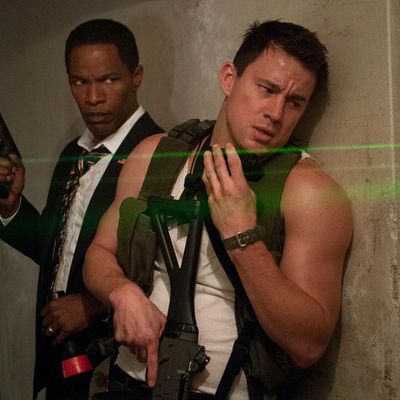
Despite having just railed against people who make noise in movie theaters, I think it’s not just permissible but essential to scream at the screen during Roland Emmerich’s White House Down. Of all the dumb megabudget Die Hard–like action pictures of the last few years (including that other White House Goes Boom movie, Olympus Has Fallen), this is both the most entertaining and the most inviting of viewers’ input. The characters need to be told— loudly — to get a move on before the terrorists can shoot them. Otherwise, they’ll tend to loiter for those personal moments that Emmerich so proudly invokes when he wants to distinguish himself from a typical disaster film director.
He certainly does have a right to be proud. In Independence Day, Godzilla, The Day After Tomorrow, and 2012, Emmerich exhibits an Ed Wood–like gift for weaving human stories in and out of action for maximum clunkiness. No matter how imminent the end of the world as we know it, there is always a moment or three for a decent man to pet a dog, bond with an estranged child, or wonder aloud if he should ask out the pretty girl who has just watched her family fall into a crevice. This is all well and good when, say, everyone’s sitting around waiting for the next earthquake or killer freeze. But when it’s 30 seconds to Armageddon and the bad guys have surface-to-air missiles, it helps (us if not them) to yell, “Stop talking and start killing!”
Two questions vie for your attention in White House Down. The first is whether right-wing militarists will assassinate an African-American president (Jamie Foxx) who has just made peacenik-y overtures to the Middle East. The second is whether Cale (Tatum Channing) — an Afghan vet who has just been blown off by Maggie Gyllenhaal for a job on the president’s Secret Service detail — will convince his adolescent daughter (Joey King) that he’s a hero. The two strands have equal weight, although screenwriter James Vanderbilt does a better job tying them together than is usual in an Emmerich movie. He puts the girl — who happens to be a geeky expert on all things presidential — in the White House at the same time as her dad, and for a while, they’re each (in separate wings/floors) alone and dodging terrorists. She has a cell phone and camera; he has his fists and the occasional gun pried from a terrorist’s cold, dead hands.
This particular subgenre allows little room for niceties: The beats are so de rigeur that as Tatum skulked around the White House I kept expecting him to bump into Gerard Butler from Olympus Has Fallen. But where Olympus was sadistic and splattery, White House Down is PG-13 and relatively (compared to other movies featuring hordes of people getting shot down or blown up) family friendly. And the political context is radically different. In Olympus, the terrorists were led by a North Korean psychopath given to mouthing leftist-sounding slogans in the presence of sundry Asians, Middle Easterners, and people of darker hues. This time it’s the enemy within. James Woods — his hair cropped short and sharp against his jagged skull and looking more than ever as if maggots are eating their way through his colon — plays the outgoing head of the Secret Service, a man still shaken by the recent death of his son (a soldier). In the end, he has less in common with a president who, in his mind, sold out the country, than a grim bunch of paramilitary types and right-wing military industrialists.
Emmerich is an old hand at blowing up the White House and finds new wings as well as other national monuments to destroy: They blow up real good. He’s not a distinguished action director, but he does get by with a car and tank chase around the White House lawn — which could easily have made you laugh so hard you spray Coke out your nostrils. Anyway, he’d be the first to tell you it’s the human relationships that matter most.
Tatum has made a specialty of always seeming a shade warmer and more intelligent than his meat-locker looks would suggest. Here he’s helped by the young actress playing his daughter, Joey King, whose clock runs faster than his and lights more of a fire under him than the terrorists do. Three actors do well with juicy supporting roles: Nicolas Wright as the dweebish-cute White House tour guide who has to play host to both terrorists and their hostages; Kevin Rankin as a particularly unhinged terrorist underling with neo-Nazi tats and a muttonchop; and Jimmi Simpson as the Eurotrashy superhacker who takes over the White House computers while blasting and mock-conducting Beethoven. I was rocked by the sight of Michael Murphy as the vice-president: So Tanner made it to the executive branch after all! He even gets to be president for a bit. (“Sir, the stock market is collapsing!”)
As the president modeled on you-know-who, Jamie Foxx is likable but a little mild-mannered for my taste. In symbolic terms, though, when an actor plays a vengeful slave (in Django Unchained) and the peace-talking leader of the free world in the space of six months, it says a lot about the new parameters of pop culture. Even neutered, Foxx is the kind of president who makes you say, “I’m down with that White House!”


